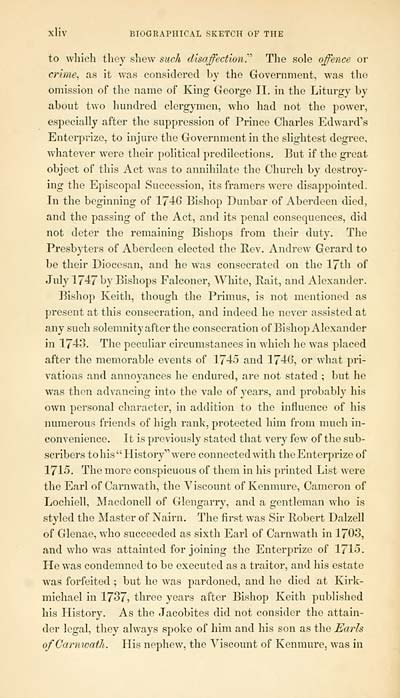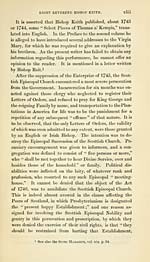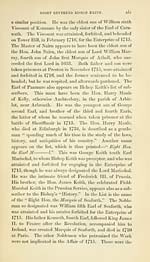Spottiswoode Society > History of the affairs of the Church and State of Scotland from the beginning of the reformation to the year 1568 > Volume 1
(52) Page xliv
Download files
Complete book:
Individual page:
Thumbnail gallery: Grid view | List view

xllV BIOGRAPHICAL SKETCH OF THE
to which they shew such disaffection!'' The sole offence or
crime, as it was considered by the Government, was the
omission of the name of King George II. in the Liturgy by
about two hundred clergymen, who had not the power,
especially after the suppression of Prince Charles Edward's
Enterprize, to injure the Government in the slightest degree,
Avhatever were their political predilections. But if the great
object of this Act was to annihilate the Church by destroy-
ing the Episcopal Succession, its framers were disappointed.
In the beginning of 174G Bishop Dunbar of Aberdeen died,
and the passing of the Act, and its penal consequences, did
not deter the remaining Bishops from their duty. The
Presbyters of Aberdeen elected the Rev. Andrew Gerard to
be their Diocesan, and he was consecrated on the 17th of
July 1747 by Bishops Falconer, White, Rait, and Alexander.
Bishop Keith, though the Primus, is not mentioned as
present at this consecration, and indeed he never assisted at
any such solemnity after the consecration of Bishop Alexander
in 1743. The peculiar circumstances in which he was placed
after the memorable events of 1745 and 1746, or what pri-
vations and annoyances he endured, are not stated ; but he
was then advancing into the vale of years, and probably his
own personal character, in addition to the influence of his
numerous friends of high rank, protected him from much in-
convenience. It is previously stated that very few of the sub-
scribers to his "History" were connected with theEnterprize of
1715. The more conspicuous of them in his printed List were
the Earl of Carnwath, the Viscount of Kenmure, Cameron of
Lochiell, Macdonell of Glengarry, and a gentleman who is
styled the Master of Nairn. The first was Sir Robert Dalzell
of Glenae, who succeeded as sixth Earl of Carnwath in 1703,
and who was attainted for joining the Enterprize of 1715.
He was condemned to be executed as a traitor, and his estate
was forfeited ; but he was pardoned, and he died at Kirk-
michael in 1737, three years after Bishop Keith published
his History. As the Jacobites did not consider the attain-
der legal, they always spoke of him and his son as the Earls
of Carnwath. His nephew, the Viscount of Kenmure, was in
to which they shew such disaffection!'' The sole offence or
crime, as it was considered by the Government, was the
omission of the name of King George II. in the Liturgy by
about two hundred clergymen, who had not the power,
especially after the suppression of Prince Charles Edward's
Enterprize, to injure the Government in the slightest degree,
Avhatever were their political predilections. But if the great
object of this Act was to annihilate the Church by destroy-
ing the Episcopal Succession, its framers were disappointed.
In the beginning of 174G Bishop Dunbar of Aberdeen died,
and the passing of the Act, and its penal consequences, did
not deter the remaining Bishops from their duty. The
Presbyters of Aberdeen elected the Rev. Andrew Gerard to
be their Diocesan, and he was consecrated on the 17th of
July 1747 by Bishops Falconer, White, Rait, and Alexander.
Bishop Keith, though the Primus, is not mentioned as
present at this consecration, and indeed he never assisted at
any such solemnity after the consecration of Bishop Alexander
in 1743. The peculiar circumstances in which he was placed
after the memorable events of 1745 and 1746, or what pri-
vations and annoyances he endured, are not stated ; but he
was then advancing into the vale of years, and probably his
own personal character, in addition to the influence of his
numerous friends of high rank, protected him from much in-
convenience. It is previously stated that very few of the sub-
scribers to his "History" were connected with theEnterprize of
1715. The more conspicuous of them in his printed List were
the Earl of Carnwath, the Viscount of Kenmure, Cameron of
Lochiell, Macdonell of Glengarry, and a gentleman who is
styled the Master of Nairn. The first was Sir Robert Dalzell
of Glenae, who succeeded as sixth Earl of Carnwath in 1703,
and who was attainted for joining the Enterprize of 1715.
He was condemned to be executed as a traitor, and his estate
was forfeited ; but he was pardoned, and he died at Kirk-
michael in 1737, three years after Bishop Keith published
his History. As the Jacobites did not consider the attain-
der legal, they always spoke of him and his son as the Earls
of Carnwath. His nephew, the Viscount of Kenmure, was in
Set display mode to: Large image | Transcription
Images and transcriptions on this page, including medium image downloads, may be used under the Creative Commons Attribution 4.0 International Licence unless otherwise stated. ![]()
| Permanent URL | https://digital.nls.uk/79597412 |
|---|
| Description | Volume I. |
|---|---|
| Attribution and copyright: |
|

